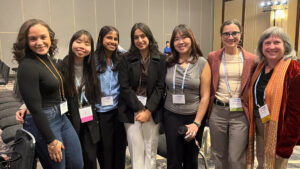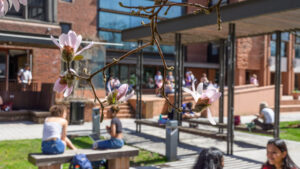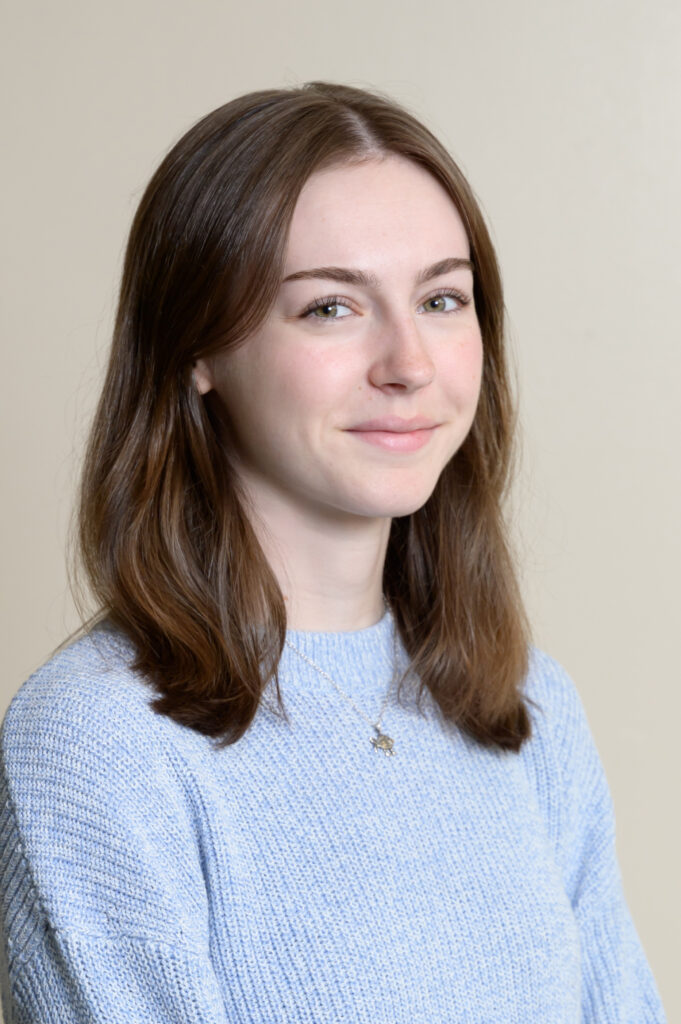
Students, Faculty, and Alumni Represent Trinity at International Neuropsychology Meeting
The 54th Annual North American Meeting of INS, “Neuropsychology in the Age of Innovation,” was held February 4-7, 2026, in Philadelphia.

Whether in the lab or on the water, Alenka Doyle ’26 has the drive and commitment to keep moving forward when things get tough.
The double major in neuroscience and English—who also is a coxswain for the Trinity College men’s varsity rowing team—has received a Barry Goldwater Scholarship, one of the most prestigious awards for students interested in pursuing careers in the natural sciences, mathematics, and engineering.

Doyle said that research, like athletics, requires discipline. “Practice is not always going to be fun. You have to be committed to continuing the work and focusing more on why you’re doing it, rather than what you’re doing in the moment,” she said. “Research may seem boring or tedious at times, and you don’t always feel like you’re contributing to a project as much as you want to be, but you need the discipline to keep going.”
This is one of the lessons Doyle has learned through her work in the lab of Associate Professor of Psychology Michael A. Grubb, where she studies visual attention. “I run Trinity students through my studies, so it’s nice to interact with people,” Doyle said. “We run experiments, interpret the results, and analyze the data with classical and Bayesian statistics, none of which I had done before. The lab was my first exposure to neuroscience.”
Grubb said that Doyle possesses the kind of dedication that can’t be taught. “When Alenka encounters something that she doesn’t understand, or a coding problem that she needs to solve, she is tireless in her dedication to figuring it out,” he said. “While it is true that she is naturally talented when it comes to understanding and carrying out the kind of research we do in the lab, it is her ‘stick-to-it-iveness’ that really takes her to the next level.”
From Chadds Ford, Pennsylvania, Doyle never considered studying neuroscience before coming to Trinity. As an avid writer since she was a child, she already knew she would pursue a creative writing concentration through her English major. Doyle also had an interest in biochemistry and was invited to join Trinity’s Interdisciplinary Science Program (ISP), a Gateway Program for first-year students.
“As I learned more about neuroscience, I realized that I find people really interesting; more so than I find cells interesting,” Doyle said. It was through ISP that she was matched with Grubb during her first year at Trinity. “I thought his research was compatible with my interests and sounded like something I’d be happy to do as a day-to-day job,” Doyle said. “Professor Grubb really allows students to contribute a lot, take the lead on projects, and do work independently. I really appreciate that because I’m someone who wants to learn things hands-on.”
In addition to her lab work and rowing, Doyle also is on the executive boards for Trinity’s Neuroscience Club and English Honors Society. Last year, she received a Beckman Scholars Award, which supports undergraduate student research.
The Goldwater Scholarship first came to Doyle’s attention through Nicole Massa ’23, a previous Goldwater Scholar from Trinity who was a mentor for Doyle in Grubb’s lab. In her application, Doyle wrote about the research she has conducted and what she would like to do in the future.
“I’m really hoping to go to graduate school to do more research in the neuroscience or cognitive science fields,” Doyle said. “I’ve worked in Professor Grubb’s lab for the past two summers, and I found that to be a fun process. It felt like something I can see myself doing every day and enjoying, so that committed me to this career path.”
Guiding Doyle through the application process for this scholarship was Alison J. Draper, the director of Trinity’s Science Center and ISP. “Dr. Draper is an incredible teacher and very helpful in finding opportunities for students,” Doyle said.
Draper added, “Alenka thrives on challenges, and research has given her unending, satisfying challenges to overcome.”
Along with providing financial support, Goldwater welcomes students into a community of scholars. Doyle said, “They have events and different resources for scholars to talk to each other about applications, jobs, and connecting with people in your area. It’s a nice way to learn more about the research world.”